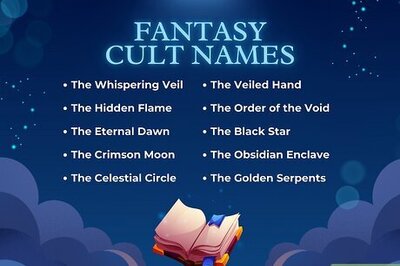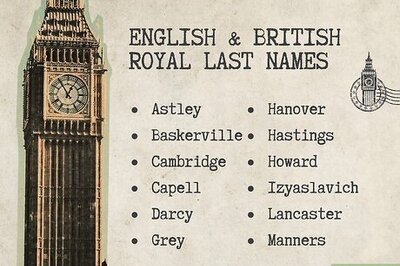
views
A Twitter banter between actors Ajay Devgn and Kichcha Sudeepa has once again trained the spotlight on a debate that has been raging since Independence: Hindi as India’s national language. But, what does the Indian Constitution have to say about this?
The topic has touched many a nerve, be it socially or politically. It has gained more traction since the BJP came to power in 2014 and then again in 2019, following the Lok Sabha elections. The saffron party has almost exclusively put the focus on the use of Hindi in an official capacity in administrations across the country, citing “colonial hangover” as a reason behind the push.
Earlier this month, union home minister Amit Shah had said Hindi should be accepted as an alternative to English and not to local languages. Presiding over the 37th meeting of the Parliamentary Official Language Committee in Delhi, Shah had said Prime Minister Narendra Modi decided that the medium of running the government is in the official language and this would definitely increase the importance of Hindi.
Indian freedom fighter Pandit Raghunath Vinayak Dhulekar, during a heated exchange in the constituent assembly in the past, once said those who did not know ‘Hindustani’ (as Hindi was referred to back then) “had no right to stay in India”. There is no mention in the Constitution that Hindi is the national language. According to the Constitution, India doesn’t have a national language as Hindi is among the 22 languages listed in the eighth schedule.
But the notion is widespread.
Iqbal’s patriotic song, ‘Saare jahan se achha’, has a line that says, ‘Hindi hai hum, watan hai Hindustan humara…’ Back then, caught up in the fight for freedom from the British, no one thought of the real idea behind Hindustan.
But, India’s formation as a nation-state belies its many diversities. And when it comes to language identity, India has had many movements to retain linguistic diversity in the past. The five landmark movements include the Urdu Language Movement (1850s), anti-Hindi Movement by Tamil-speaking people (1937), Bangla Movement (close to 1947), Vishalandhra Movement (1953), and Kannad Movement (1980s).
Experts, too, say the notion of a national language while being a charged issue has always struggled against the concept of India’s linguistic diversity. Just as the concept of a single national identity has clashed against the country’s multicultural ethos.
According to an essay, Language Movements and Democracy in India, penned by political scientist Mithilesh Kumar Jha and published as a blog by the London School of Economics, language movements have been around since colonial rule. But it was during the nationalist phase that the question of “national language” really emerged to become a politically and emotionally charged issue.
“The Hindi-Urdu debate is well-known and widely explored. In the first few decades after independence, India witnessed numerous linguistic riots, the linguistic reorganisation of states and clashes between supporters of Hindi and resistances to its ‘imposition’ as the ‘national’ language, especially from speakers of Tamil and other South Indian languages,” the essay states.
What does the Constitution say?
In a report published by the news website India.com, in 1950, the Constitution accorded Hindi in Devanagari script to be the official language of the union along with English under Article 343. Part XVII of the Constitution deals with Official Language.
“The official language of the Union shall be Hindi in Devanagari script. The form of numerals to be used for the official purposes of the Union shall be the international form of Indian numerals”, the Constitution states.
The report also mentions that the Constituent Assembly, while discussing the Language Formula noticed the recommendation of the Sub-Committee on Fundamental Rights, which recommended the formula as per which, “Hindustani, written either in Devanagari or the Persian script at the option of the citizen, shall, as the national language, be the first official language of the Union. English shall be the second official language for such period as the Union may, by law, determine.”
What is the new debate?
In response to a statement by south star Kichcha Sudeep that “Hindi is no more our national language”, Bollywood star Ajay Devgn on Wednesday said if Hindi was not the national language of India, why were movies made in different languages and eventually dubbed in Hindi. At a film launch event last week, Sudeep was asked how he viewed the record-breaking pan-India success of the Kannada film KGF: Chapter 2, the Hindi version of which alone has minted Rs 336 crore since its April 14 release. The film has reportedly earned Rs 850 crore worldwide.
Devgn, who recently starred in filmmaker SS Rajamouli’s pan-India blockbuster RRR, tagged the Karnataka-based actor on Twitter and wrote, “Hindi was, is and always will be our national language.” “My brother, according to you if Hindi is not our national language then why do you release your mother tongue movies by dubbing them in Hindi?” Devgn wrote in Devanagari, the Hindi script. “Hindi was, is and always will be our mother tongue and national language. Jana Gana Mana,” the actor-filmmaker added in his tweet.
Addressing the media in Kannada, Sudeep had said, “Hindi (filmmakers) should say they are making pan India movies. They have been dubbing those (Bollywood) movies into Tamil and Telugu, etc and they are struggling. They are not able to. Today, we just make films that reach everywhere.”
His comments had sparked a debate on social media over the apparent imposition of Hindi, with many fans of the actor defending his stand. Devgn’s tweet prompted Sudeep to post a reply explaining that his statement was perhaps taken out of context.
Politicians weigh in
Matters have taken a political turn with Karnataka chief minister Basavaraj Bommai and former CMs Siddaramaiah and HD Kumaraswamy joining the debate and insisting that Hindi is like any other language in India and not the national language. Bommai’s cabinet colleague Dr CN Ashwath Narayan, however, said there was nothing wrong in learning Hindi as a communicative language at the national level.
“Whatever Sudeep has said is correct. After the formation of states on linguistic basis, languages got importance there (in those regions). That is supreme. The same has been said by Sudeep, which is right. Everyone should accept and respect it,” Bommai said.
“Hindi was never and will never be our national language. It is the duty of every Indian to respect linguistic diversity of our country. Each language has its own rich history for its people to be proud of. I am proud to be a Kannadiga!” Siddaramaiah tweeted.
Kumaraswamy, too, aired a view similar to Siddaramaiah and backed Sudeep. “India is a garden of several languages. Land of multi cultures. Let there be no attempts to disrupt this,” he added in his series of tweets on Thursday. He said just because a large population spoke Hindi, it did not make it a national language, and less than nine states, Kashmir to Kanyakumari, had Hindi as second or third language or not even that.
(With PTI inputs)
Read all the Latest India News here



















Comments
0 comment